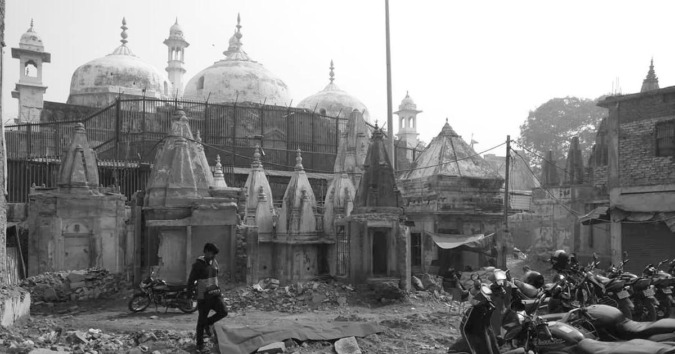
The Gyanvapi mosque, situated in Varanasi, Uttar Pradesh, is in close proximity to the Kashi Vishwanath temple.
This temple was constructed in 1780 under the patronage of Ahilyabai Holkar, the Queen of Indore, and it holds significant importance for Hindu devotees as it venerates the deity Shiva.
Recent petitions have raised claims that the Gyanvapi mosque stands on the site of the ‘original’ Kashi Vishwanath temple. While the veracity of these claims remains uncertain, scholars assert that the mosque does indeed occupy the remains of a Vishweshwara temple, also dedicated to Shiva.
The exact age of the Vishweshwara temple is ambiguous, but historical records suggest it was initially demolished in the 12th century by Qutub-ud-din Aibak, the General of Ghurid Sultan Mohammad Gauri.
Attempts at rebuilding the Vishweshwara temple were hindered by Princess Raziyat-ud-din of the Delhi Sultanate, who ordered the construction of a mosque on the temple’s ruins in the 13th century. This decision further solidified the Islamic presence in the area and led to the establishment of the Gyanvapi mosque as it stands today.
In this article, we explore some of these hidden gems to provide a deeper understanding of the Gyanvapi.
The Origin of The Name
The name “Gyanvapi” translates to “Well of Knowledge” in Hindi. Legend has it that when the Mughal Emperor Aurangzeb demolished a portion of the original Kashi Vishwanath Temple to construct the Gyanvapi Mosque, the priests of the temple managed to preserve some sacred relics and scriptures by submerging them in a well located within the temple complex. This well came to be known as Gyanvapi.
The Controversy Surrounding the Gyanvapi Mosque
The construction of the Gyanvapi Mosque on the same site as the Kashi Vishwanath Temple has been a subject of controversy for centuries. Some historical accounts suggest that the mosque was built after partially demolishing the original temple, while others claim that the mosque’s foundation was laid upon the temple’s ruins. This has led to prolonged legal battles and disputes.
The Underground Tunnels
One of the lesser-known aspects of Gyanvapi is the existence of underground tunnels within the temple complex. These tunnels are said to date back centuries and have remained closed to the public. Their exact purpose and where they lead to remains a mystery, fuelling speculation and intrigue among historians and archaeologists.
The Hidden Carvings And Inscriptions
Inside the Gyanvapi Mosque and Kashi Vishwanath Temple, several hidden carvings and inscriptions have been discovered by scholars and researchers. These enigmatic markings provide insights into the architectural and cultural history of the site and are currently being studied to unravel their significance.
The Role of Queen Ahilyabai Holkar
During the 18th century, Queen Ahilyabai Holkar, the ruler of Indore, took an interest in the preservation and restoration of the Kashi Vishwanath Temple. She made significant contributions to rebuilding and refurbishing the temple, helping to retain its grandeur even in turbulent times.
Conclusion
Gyanvapi is more than just a place of worship; it is a site of historical and cultural significance that has witnessed centuries of religious and political developments. These lesser-known facts about Gyanvapi shed light on its rich and complex history, contributing to a deeper appreciation of the site’s importance in India’s heritage.
What's Your Reaction?
One of my friends once said, I am in love with words and a zoned out poser... well, I will keep it the way it has been said! Besides that you can call me a compulsive poet, wanna-be painter and an amateur photographer





